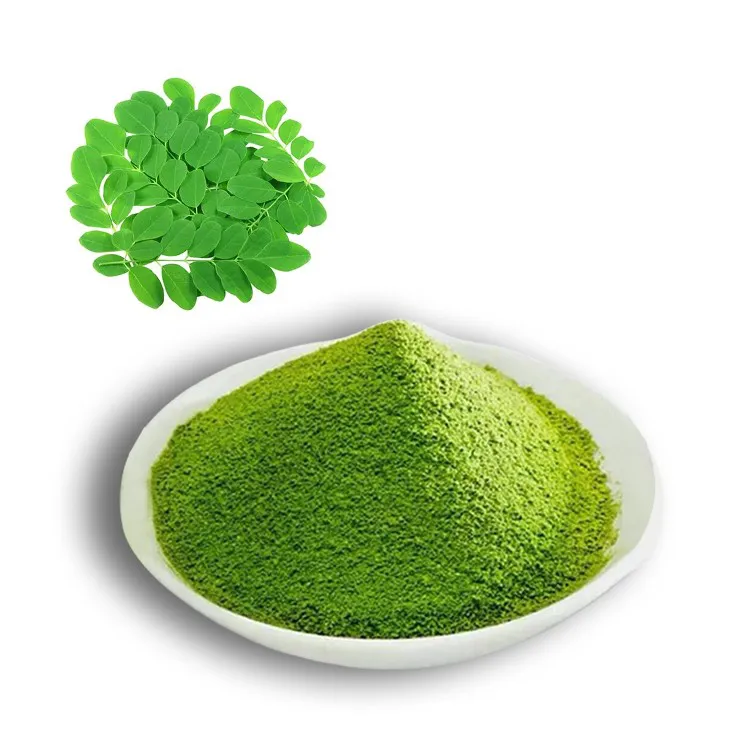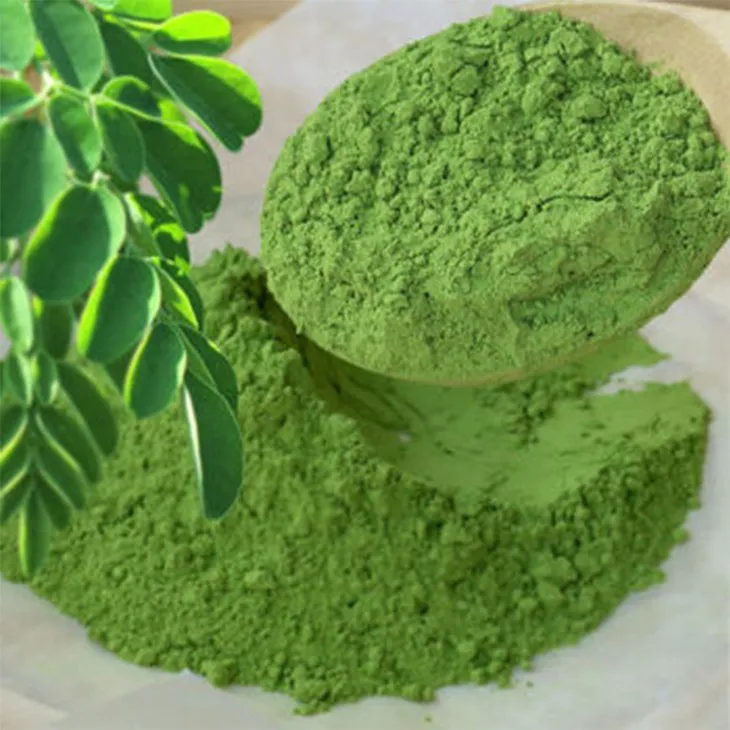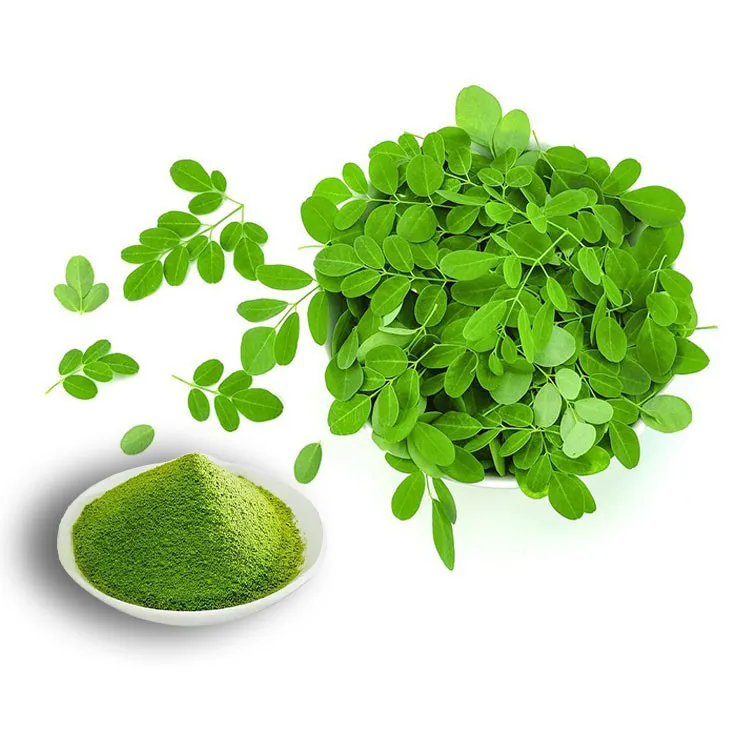- 0086-571-85302990
- sales@greenskybio.com
What is moringa powder? Definition, types, history and nutritional value.
2024-12-10

What is Moringa powder?
Moringa powder is a valuable substance that is obtained from the Moringa oleifera tree. It is essentially the result of dehydrating and pulverizing the leaves of the Moringa oleifera. This process transforms the leaves into a fine powder form, which is highly convenient for consumption as well as for use in a wide variety of products. The powder can be easily added to different recipes, whether it be in cooking, baking, or for making smoothies and other beverages. It also serves as an ingredient in the production of dietary supplements, skincare products, and more.

Types of Moringa powder
Based on Origin
- African - sourced Moringa Powder: Moringa powder sourced from Africa may have a slightly different nutrient profile compared to that from other regions. The soil, climate, and agricultural practices in Africa can influence the composition of the moringa trees grown there. For example, the levels of certain minerals or vitamins might vary. - Asian - sourced Moringa Powder: In Asia, where the Moringa tree has a long history of cultivation, the moringa powder may have its own unique characteristics. Asian - sourced moringa powder might be more commonly used in traditional Asian cuisine or medicine, and could potentially have different levels of phytochemicals due to the local environmental factors.
Based on Purpose
- Culinary - use Moringa Powder: There are moringa powder products that are specifically designed for use in cooking. These may come in different flavors, such as adding a hint of citrus or spice to enhance the taste when used in recipes. They may also be blended with other ingredients like herbs or spices to create unique flavor combinations. For instance, it can be used in soups, stews, or as a seasoning for meat and vegetable dishes. - Medicinal or Dietary Supplement Moringa Powder: This type of moringa powder is often more concentrated and purified for the purpose of providing specific health benefits. It is commonly used to supplement the diet with essential nutrients, phytochemicals, and other bioactive compounds. It may be used to address various health concerns, such as improving digestion, boosting the immune system, or reducing inflammation.

History and Origin
The Moringa tree, from which moringa powder is derived, has a very long and rich history. Its first recorded use dates back to around 2000 BC in India. In ancient India, the Moringa tree was not only an important source of food but also a fundamental part of traditional medicine. People used different parts of the tree, including the leaves, which are now used to make moringa powder, for treating various ailments. For example, it was used to relieve digestive problems, reduce fever, and promote overall well - being.
From India, the Moringa tree gradually spread to other tropical and subtropical regions around the world. This spread was facilitated by trade, migration, and the adaptability of the tree to different environmental conditions. As globalization increased in recent decades, the popularity of the Moringa tree and its products, including moringa powder, has soared globally. Today, it is cultivated in many countries across Africa, Asia, and South America, and is becoming increasingly well - known in Western countries as well.

Nutritional Value
Moringa powder is truly outstanding in terms of its nutritional content.
Protein
It contains a significant amount of protein. Protein is essential for the body as it is involved in numerous vital functions. For example, it is crucial for muscle building and repair. Whether you are an athlete looking to build muscle mass or someone recovering from an injury, the protein in moringa powder can be beneficial. It provides the necessary building blocks, known as amino acids, for the body to synthesize new muscle tissue or repair damaged ones. Moreover, for vegetarians and vegans, moringa powder can be an excellent source of plant - based protein, which can help meet their daily protein requirements.
Omega - 3 Fatty Acids
The presence of omega - 3 fatty acids in moringa powder is another important aspect of its nutritional value. Omega - 3 fatty acids are well - known for their role in supporting heart health. They can help reduce inflammation in the body, which is often associated with various heart diseases. By consuming moringa powder regularly, one can potentially lower the risk of developing heart problems. Additionally, omega - 3 fatty acids are also beneficial for brain health, as they play a role in cognitive function and may help prevent age - related cognitive decline.
Phytochemicals
Moringa powder is rich in phytochemicals. These are natural compounds found in plants that have various health - promoting properties. One of the main benefits of the phytochemicals in moringa powder is their antioxidant activity. Antioxidants help protect the body from oxidative stress, which is caused by free radicals. Free radicals are unstable molecules that can damage cells and DNA in the body, and are associated with aging, cancer, and other diseases. By consuming moringa powder, the antioxidants in it can neutralize these free radicals, reducing the risk of cellular damage.
- Another important property of the phytochemicals in moringa powder is their antimicrobial and anti - fungal properties. This means that they can help fight against harmful bacteria, viruses, and fungi in the body. For example, they can help prevent infections in the digestive tract, respiratory system, or on the skin. In a world where antibiotic resistance is becoming an increasing concern, the natural antimicrobial properties of moringa powder could potentially be a valuable alternative for maintaining good health.
Other Nutrients
- Moringa powder also contains a variety of vitamins, such as vitamin A, vitamin C, and vitamin E. Vitamin A is important for vision, immune function, and skin health. Vitamin C is an antioxidant that helps boost the immune system and is also involved in collagen synthesis, which is important for healthy skin, bones, and joints. Vitamin E is another antioxidant that protects cell membranes from damage. - Minerals are also present in moringa powder. For example, it contains calcium, which is essential for strong bones and teeth; iron, which is necessary for oxygen transport in the blood; and potassium, which plays a role in maintaining proper heart function and fluid balance in the body.
FAQ:
What are the main uses of moringa powder?
Moringa powder can be used in various ways. It is used in culinary applications, such as adding it to smoothies, soups, or baked goods for an extra nutritional boost. It is also popular as a dietary supplement due to its high nutritional value, and in some traditional medicine systems, it is used for its purported health - promoting properties.
How does the origin affect the quality of moringa powder?
Different origins can lead to variations in the nutrient profiles of moringa powder. For example, environmental factors like soil quality and climate can influence the growth of the Moringa oleifera tree. African - sourced moringa powder may have a different composition compared to Asian - sourced powder. However, overall quality also depends on factors like harvesting and processing methods.
Can moringa powder replace other protein sources?
Moringa powder contains a significant amount of protein, but it may not completely replace all other protein sources. While it is a good source of plant - based protein, different protein sources offer different amino acid profiles. However, it can be a valuable addition to a diet, especially for vegetarians and vegans looking to diversify their protein intake.
What are the health benefits specifically related to the phytochemicals in moringa powder?
The phytochemicals in moringa powder provide antioxidant, antimicrobial, and anti - fungal properties. Antioxidants help to protect cells from damage caused by free radicals, which can contribute to various diseases. The antimicrobial and anti - fungal properties may help the body fight off infections and maintain a healthy balance of microorganisms.
How should moringa powder be stored?
Moringa powder should be stored in a cool, dry place, away from direct sunlight. It is best to keep it in an airtight container to prevent moisture and air from affecting its quality. If stored properly, it can maintain its nutritional value for an extended period.
Related literature
- The Nutritional and Medicinal Properties of Moringa oleifera: A Review"
- "Moringa oleifera: A Multipurpose Tree with Promising Health Benefits"
- "A Comprehensive Analysis of Moringa Powder: Nutrient Composition and Functional Properties"
- ▶ Hesperidin
- ▶ citrus bioflavonoids
- ▶ plant extract
- ▶ lycopene
- ▶ Diosmin
- ▶ Grape seed extract
- ▶ Sea buckthorn Juice Powder
- ▶ Beetroot powder
- ▶ Hops Extract
- ▶ Artichoke Extract
- ▶ Reishi mushroom extract
- ▶ Astaxanthin
- ▶ Green Tea Extract
- ▶ Curcumin Extract
- ▶ Horse Chestnut Extract
- ▶ Other Problems
- ▶ Boswellia Serrata Extract
- ▶ Resveratrol Extract
- ▶ Marigold Extract
- ▶ Grape Leaf Extract
- ▶ blog3
- ▶ blog4
- ▶ blog5
-
Pure 85% Tomentil Extract.
2024-12-10
-
Pueraria Lobata Extract
2024-12-10
-
Eucommia Ulmoides Extract
2024-12-10
-
Citrus Aurantium Extract
2024-12-10
-
White mustard seed extract
2024-12-10
-
Rosemary extract
2024-12-10
-
Cranberry Extract
2024-12-10
-
melatonin extract
2024-12-10
-
Thunder God Vine Extract
2024-12-10
-
Lemon Balm Extract
2024-12-10
-
Motherwort Extract
2024-12-10





















